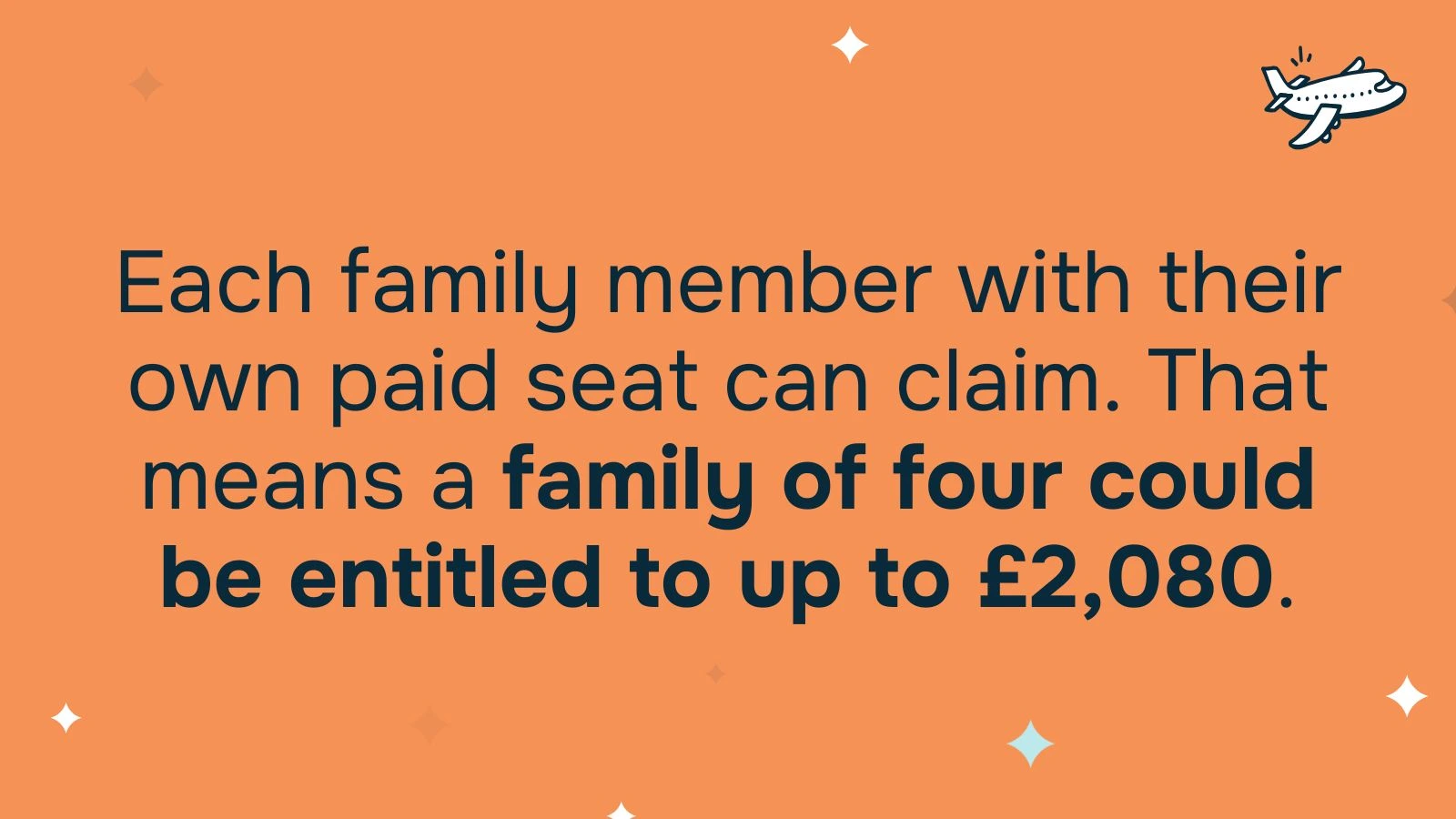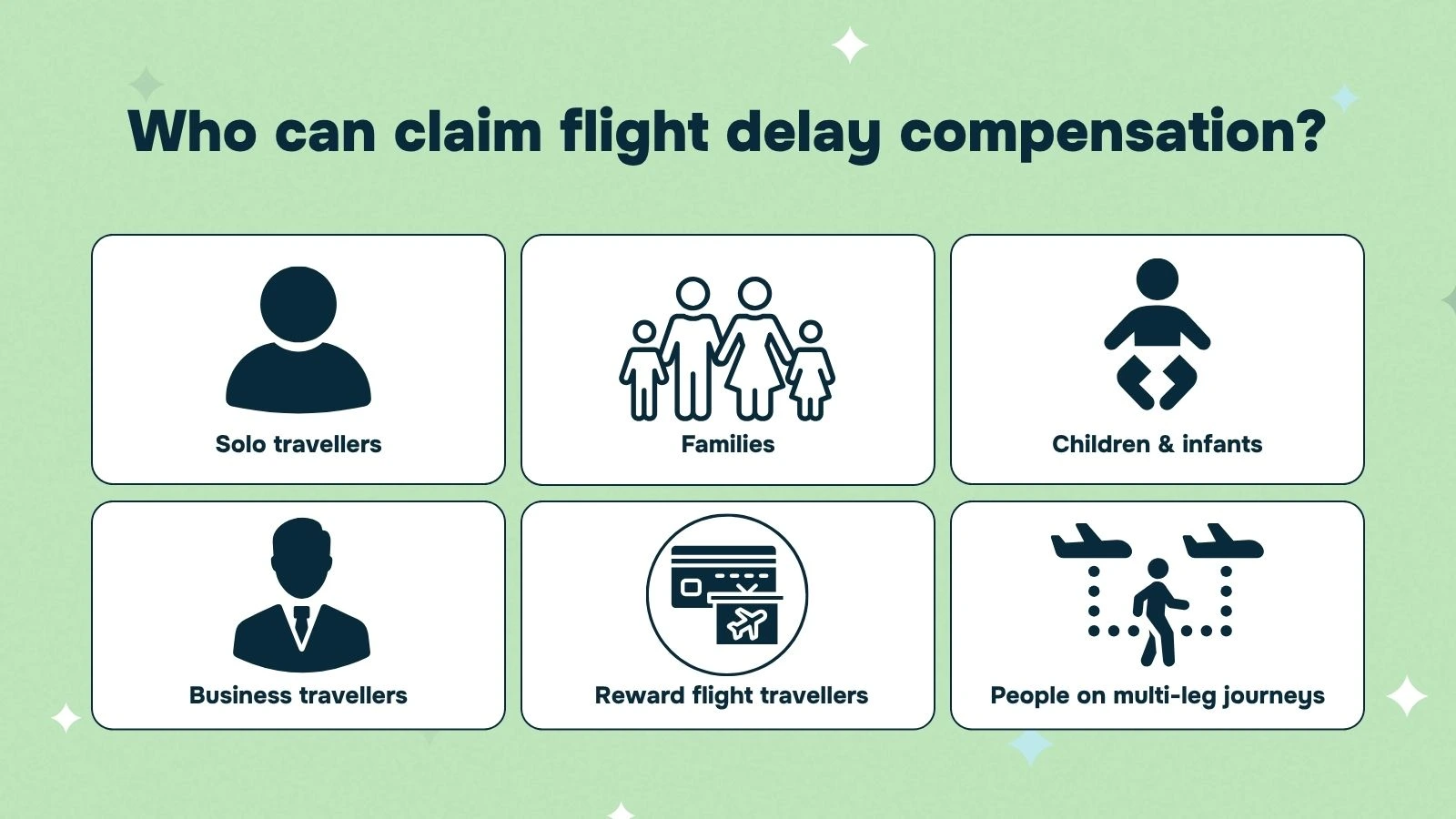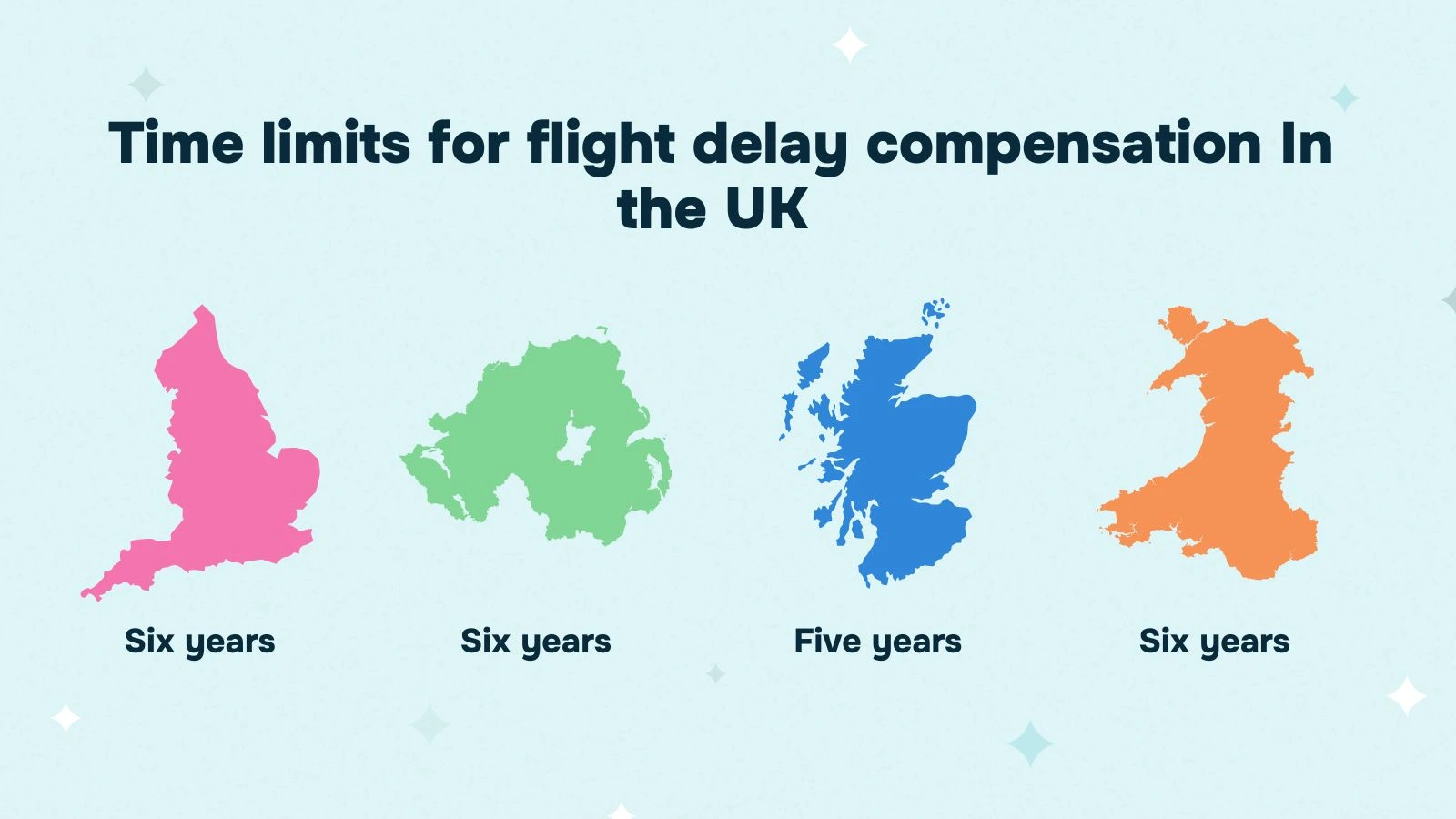
Flight delays are more than just frustrating – they can ruin plans, waste hours, and cost you money. Whether you’re travelling for business, a weekend city break, visiting family, or heading abroad for some well-earned rest, you have rights when things go wrong. And you could be entitled to compensation of up to £520 per person.
How to claim flight delay compensation
In this guide, we’ll break down who qualifies for flight delay compensation, what you can claim, and how to take action without the stress – so you can take back some control when air travel doesn’t go to plan.
Every year, millions of UK passengers face flight delays. Some are minor inconveniences. Others are costly disruptions with real knock-on effects – missed meetings, lost time with family, or an entire weekend away wiped out.
In the UK, if your flight is significantly delayed and the cause is something the airline could have prevented, you have the right to claim compensation. The rules are set out in law, and they’re there to protect passengers from bearing the full cost of disrupted journeys.

Under UK law, if your flight is delayed by three hours or more and it was within the airline’s control, you could be legally entitled to up to £520 in compensation per person. Claims are based on the number of passengers on the booking. That means hundreds in compensation for solo travellers, and potentially thousands for couples or families.
This applies to flights that:
It doesn’t matter whether you were travelling for business, pleasure, or any other reason – your rights are the same.
Your flight arrived at least three hours later than scheduled
Your flight departed from or arrived at a UK/EU airport on a UK/EU airline
The flight delay was the airline’s responsibility
The flight departed in the last six years.
Flight delay compensation depends on the distance of your flight and the length of the delay at your final destination:
Delay less than 3 hours
£0
Delay 3 hours or more
Up to £350
Delay more than 4 hours
Up to £520
Delay 3 hours or more
Up to £520
Compensation doesn’t only apply to delayed flights. If your journey is significantly disrupted by a cancellation or missed connection, you may be entitled to compensation.
For cancellations, the airline must also offer you the choice between a full refund or an alternative flight. If the rebooked flight results in a late arrival, compensation may apply depending on the timing and reason for the disruption.
Missed connections are a common issue, particularly when flying on multi-leg journeys. If your initial flight was delayed and caused you to miss a connecting flight that was part of the same booking, and you arrived late at your final destination, you’re protected.
To qualify for flight delay compensation, the most important factor is whether the airline could have done something to prevent the disruption.
If your flight isn’t covered under UK or EU regulations – for example, if you’re flying between two non-European countries – you may still be protected by an international agreement called the Montreal Convention.
The Montreal Convention is a global treaty that governs airline liability for international flights. It applies to over 130 countries, including the UK, and offers a framework for passengers to claim damages for flight delays, cancellations, lost baggage, and injury.
Unlike UK law, it doesn’t offer fixed compensation amounts for delays. Instead, it allows passengers to claim for actual, proven financial losses that result from the disruption.
It’s important to note that emotional distress or inconvenience alone is not covered. You must be able to demonstrate clear, quantifiable losses.
Because the Montreal Convention doesn’t offer the same automatic compensation as UK law, it can be harder to claim successfully. That said, it remains a valuable option for international travellers when other routes aren’t available.
Airlines are responsible for paying compensation when the disruption to your journey was within their control. This includes situations such as:
These are all circumstances where the airline could have reasonably taken action to avoid the delay or cancellation. In such cases, you are likely entitled to compensation.
Airlines are not obliged to pay if the delay or cancellation was due to what the law calls “extraordinary circumstances”.
According to EU Regulation 261/2004, which remains in force in the UK post-Brexit, extraordinary circumstances refer to events that are genuinely beyond the airline’s control and could not have been avoided even if the airline had taken all reasonable precautions.
This rule is designed to protect airlines from being held liable in situations where they had no real control. However, its application is often contentious, with some airlines citing extraordinary circumstances as a default reason to reject claims.
Sometimes, the cause of the disruption doesn’t lie with the airline but with the airport itself. In these situations, UK flight delay compensation usually doesn’t apply because the airline isn’t legally liable.
For example, in 2025, thousands of passengers were left stranded at Heathrow Airport after a sudden power outage triggered major disruption. Flights were grounded, terminals became overcrowded, and the incident affected an estimated 200,000 travellers across 1,300 flights. Despite the wide scale disruption, affected travellers were not eligible for compensation as the event was treated as an extraordinary circumstance.
However, if the line between airport and airline responsibility isn’t clear, it’s worth checking a claim anyway. The airline must investigate and provide evidence if they wish to deny your claim based on extraordinary circumstances.
Possibly – but it depends on the terms of your policy. Most travel insurance policies include some form of cover for delayed flights, but the conditions, payout limits, and delay thresholds can vary significantly.
Typically, insurance will only cover you after a specified minimum delay, often 6 or 12 hours. It’s also usually intended to cover additional costs such as food, accommodation, or alternative transport – not compensation for inconvenience.
In contrast, flight delay compensation under UK law is a fixed amount based on how late you arrived at your destination and doesn’t require proof of loss.
You may be able to claim both airline compensation and travel insurance if the circumstances qualify under both policies. However, your insurer may ask whether you’ve already claimed from the airline, and any overlap could affect your payout.
As long as you had a valid booking and the disruption meets the legal criteria, you could be entitled to flight delay compensation, regardless of why or how you were flying.

Flight delay compensation claims aren’t only for recent travel mishaps. UK law gives you a generous window of time to claim, allowing you to seek redress even for older journeys you may have written off.
This means that even if your flight disruption happened several years ago, you may still be eligible for compensation today. The key is whether the flight met the legal criteria at the time – and whether you act before the deadline expires.
So if you’ve experienced a delay or cancellation in the past and never looked into your rights, it’s not too late. It could be worth digging out those old boarding passes or checking your email for booking confirmations. A delay you endured years ago could still lead to hundreds of pounds in compensation today.

If you’re facing a delay, there are practical steps you can take to strengthen any future compensation claim and protect your rights:
These prove you were booked on the flight and can be vital when making a claim.
The compensation clock starts ticking from the time your flight was scheduled to land, so make a note of when the plane actually took off and touched down.
Politely request an explanation and record what they say. If possible, get it in writing. Vague terms like "operational issues" may not hold up if challenged.
These can be helpful if you need evidence of the delay length or the airline's messaging on the day.
If the airline fails to provide necessary care and assistance during a long delay, you may be able to claim these costs back.
Some airlines offer vouchers as a goodwill gesture, but accepting them might affect your eligibility for cash compensation. Always read the small print.
Regardless of whether you’re eligible for cash compensation, airlines must look after you if your delay reaches certain thresholds. These entitlements are grounded in passenger welfare obligations and apply whether the delay is the airline’s fault or not. They ensure you’re not left stranded without basic necessities while waiting for your flight.
If your flight is delayed by two hours or more, depending on the flight distance, you are entitled to:
Usually offered as vouchers, but if not provided, you can buy your own and claim the cost back later.
This typically includes access to phone calls or emails so you can inform others of your delay or rearrange plans.
If the delay extends overnight, the airline must provide you with a place to stay.
This includes transfers between the airport and hotel if accommodation is necessary.
Even when passengers meet the criteria for compensation, some airlines attempt to avoid paying out. Unfortunately, this is not uncommon.
Airlines may try to reject valid claims by:
If this happens, don’t let the process end there. You have options:
Many UK airlines and airports are signed up to ADR schemes. These are independent organisations authorised to resolve disputes without going to court. If your airline is a member of an ADR scheme, you can submit your case directly to them through their websites.
To make an appeal, you’ll need to provide supporting documents, such as your booking confirmation, correspondence with the airline, and details of the delay. ADR bodies will then assess the evidence and issue a binding decision if they rule in your favour.
If the airline is not a member of an ADR scheme, and you believe you have a valid claim, you can take your complaint to the CAA’s Passenger Advice and Complaints Team (PACT).
Before you do this, you’ll need to give the airline an opportunity to respond directly to your complaint.
If you don’t receive a response within 8 weeks (or you’re unhappy with the outcome), you can escalate through the CAA’s online portal. The PACT team will review the details of your complaint and, where appropriate, help mediate a resolution.
Many legal professionals specialising in consumer flight rights offer support on a no win, no fee basis. This means you won’t have to pay anything unless your claim is successful, making it a low-risk option for pursuing what you’re owed.
Pursuing a claim through a regulated UK law firm can be particularly useful when airlines are uncooperative, slow to respond, or repeatedly deny valid claims without sufficient justification.
If you want support with this process, we can connect you with a regulated UK law firm to take over your case.
Use our instant eligibility checker to see if you qualify to make a flight delay compensation claim.
Still have questions about your rights, the claims process or what counts as a delay? Here are some of the most common queries we hear from UK travellers – along with clear, practical answers to help you understand where you stand.
If your flight arrives at least three hours later than originally scheduled (when the plane opens its doors), you could be eligible for compensation.
Yes. You, the passenger, have the right to compensation – even if your employer paid for the ticket. The law recognises that compensation is owed to the person who experienced the inconvenience, not the one who made the booking or covered the cost. If your flight meets the eligibility criteria, you can claim regardless of whether it was a work trip.
No problem. Claims are assessed based on your flight and passenger rights, not who you booked through. Whether you used a comparison website, a high street travel agent, or booked directly with the airline, you’re still entitled to claim if your flight was delayed or cancelled in a way that qualifies.
Yes. If you were denied boarding because the airline overbooked the flight, you can make a claim for compensation if you arrived at your final destination more than three hours later than the originally scheduled flight.
Not for financial compensation. The law requires a delay of at least three hours at your final destination before compensation kicks in. However, if you’re delayed by two or more hours, you’re still entitled to care and assistance from the airline.
Yes, if they had a paid seat on the flight. Children and infants who occupied their own seat are entitled to the same compensation as adults. However, infants travelling on a parent’s lap without a separate ticket are usually not eligible.
It depends on the airline. Some resolve claims within a few weeks, while others may take several months, especially if legal pressure is needed. Airlines are expected to respond within a reasonable time frame (typically within 8 weeks), but delays are common. If they ignore your claim or deny it unfairly, you may need to escalate it.
Yes. If you’ve experienced multiple delays or cancellations that meet the compensation criteria – even years apart – you can submit separate claims for each. Be sure to keep records of your bookings, dates, and the details of each disruption.
You can make a DIY flight delay claim without a lawyer. However, using a UK law firm experienced in flight delay claims, with an in-depth understanding of the ‘extraordinary circumstances’ rule, will help you make the most robust claim possible.

At Join the Claim, we make sure consumers know their rights and can take action when they’ve been treated unfairly. With our help, you can avoid the jargon, skip the stress, and focus on getting what you’re owed.
Working in association with SRA-regulated flight delay experts who have claimed over £79 million in compensation from the airlines, you can be confident your claim is in safe hands.
Claiming compensation is simpler than you might think. You can claim for flights that took place up to six years ago in England and Wales (or five years in Scotland). Here’s how to get started:
Use our fast and free online eligibility checker to see if you are eligible for flight delay compensation.
Provide a few details about your disrupted flight and join the claim online. We’ve made the process easy and jargon-free.
We’ll connect you with flight delay experts who will investigate your claim and aim to get your compensation ASAP.
Join the Claim and reclaim what’s rightfully yours.

Bee is the content lead at Join the Claim, where she helps people understand their rights and take action when they’ve been wronged. With a background in PR, copywriting, and content strategy, she’s spent over a decade writing about legal matters – turning complex topics into clear, accessible resources that inform and empower.
From writing about data breaches to explaining how group claims work, Bee’s goal is always the same: to give people the confidence they need to take the next step. She’s committed to making legal information feel human, relevant, and easy to trust.
Disclaimer
This guide is for general information purposes only and does not constitute legal advice. While we aim to provide accurate and up-to-date information, flight delay compensation eligibility depends on specific circumstances and applicable laws. Always consult a qualified legal professional or regulated claims provider if you’re unsure about your rights or how to proceed with a claim.
Last Updated: 1 July 2025
Sign up for our newsletter to stay up to date.

We connect consumers with their legal dream teams to ensure they get the compensation and support they deserve.
Join the Claim is not a law firm. We connect individuals with top law firms for group action claims, and our service is free to use. While we may receive a fee from the law firms we introduce you to, this will not affect your costs or compensation. We are not responsible for the advice or services provided by these firms. Please note, nothing on this website is legal advice, and while we check claim eligibility, we cannot guarantee a law firm will accept a case.
Join the Claim is a registered trading name of Big on Media ltd. Big on Media is registered in the United Kingdom under licence number 09878028 with its registered office located at Big on Media, 6 Sunderland Street, Tickhill, Doncaster, DN11 9QJ
© Join the Claim All Rights Reserved | 2025